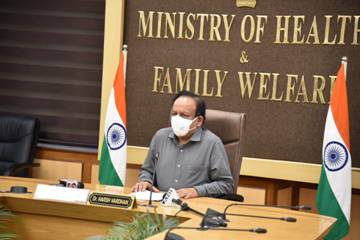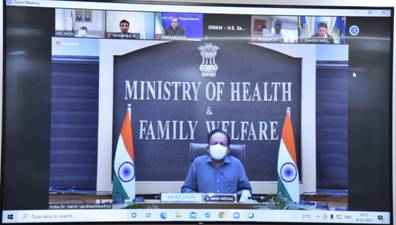Dr. Harsh Vardhan, Union Minister for Health and Family Welfare virtually addressed the conference on “COVID-19 Pandemic: A Call for Health Security and Peace in the WHO Eastern Mediterranean Region today.

Remembering the one-year wrath of the novel coronavirus, since, COVID-19 was declared a Public Health Emergency of international concern and reminding everyone that how the pandemic has shown that nobody is safe until all of us are safe, Dr Harsh Vardhan said, “The pandemic has underlined the need for greater collaboration between countries on various aspects of health. Therefore, it is desirable to exchange our experiences, our learnings, our innovations as well as our best practices to help strengthen health systems across the world. We must admit that in such times of global crisis, both risk management and mitigation would require further deepening of global partnerships to re-energize interest and investment in global public health. We also need to conquer the adversary by supplementing each others capacity by pooling our resources.”
Speaking about the importance of collaborative effort in the fight against this deadly virus, the Union Health Minister said, ‘An important lesson COVID19 has taught us is that preparedness costs only a fraction of the impact of a pandemic, but the returns on this investment are exponential. This pandemic disrupted life as we knew it, but also provided a steep learning curve for all of us to become more resilient and better prepared for the future. But we must all understand & agree, shared challenges shall only be overcome through shared efforts. No country can prepare or remain safe in silos.’

Dr Harsh Vardhan further informed India’s pre-emptive, proactive and graded response characterized by the “whole of Government” approach to manage the challenges posed by the COVID-19 pandemic. India’s federal structure & subsequent public health system posed various challenges due to the wide diversity that prevails throughout the length and breadth of the country. The Union Health minister highlighted that considering this, India’s pandemic management was based on centralized monitoring but decentralized implementation approach. He added that to effectively monitor pandemic, India established a digitally enabled COVID War room at the Central level as well as the State level to increase agility and enhance efforts in our fight against the virus. “One of the most crucial aspects of our fight against COVID19 was centralized training of frontline health workers and constant dissemination of authenticated information to the masses through various mediums to mitigate the misconceptions around COVID19 and to spread awareness about COVID appropriate behaviour, he added.
The minister highlighted India’s response to handling the COVID-19 pandemic in respect to technical innovations related to surveillance, logistic and supply chain management, medical devices and other aspects of clinical management that have been introduced in response to COVID-19 like CoVID India Portal, ICMR Portal, RT-PCR app, Facility App, ArogyaSetu App, ITIHAS app, Telemedicine (for CoVID and Non-CoVID services). To ensure the continuity of health services during the pandemic, a nationwide Telemedicine service (eSanjeevani OPD application) was launched and in a short span of 14 months, more than 5 million consultations have been conducted in 28 States in India.
Highlighting the need for vaccination, the Minister said that “Vaccination is an important strategy for disease prevention and plays a critical role in mitigating the impact of a pandemic. . India launched the world’s largest vaccination drive against COVID19 on Jan 16 this year. India has extensively utilized digital technologies for effective implementation of the CoWIN platform created for inventory management and delivery of COVID -19 vaccine’. India has also engaged with various countries bilaterally by providing vaccinations in grants under the humanitarian initiative Vaccine Maitri. Under this initiative, India has also supplied one lakh vaccine dose to Oman.
The Union Health Minister highlighted that Oman is an important strategic partner of India linked by geography, history and culture and enjoys warm and cordial relations. In the field of Healthcare, India and Oman have already established a well-versed mechanism through Joint Working Group.
Dr Harsh Vardhan also pointed out that the exponential increase in urbanisation has not just led to massive Non-communicable and communicable diseases, but also several other public health threats. He thus emphasized the need for greater collaboration between countries on various aspects of health and stressed for exchange of experience, learning, and innovations as well as best practices to strengthen health systems. He suggested that our programs must be designed to prepare to work in a world largely shaped and defined by rapidly changing realities, better equipped to face sudden public health threats like pandemics. He finally concluded that India is committed to tirelessly champion the cause of “health for all” across the world as we believe the world is one and efforts of further global cooperation must be encouraged.
****
MV
HFW/Health Security and Peace WHO EMR/19th May2021/7

